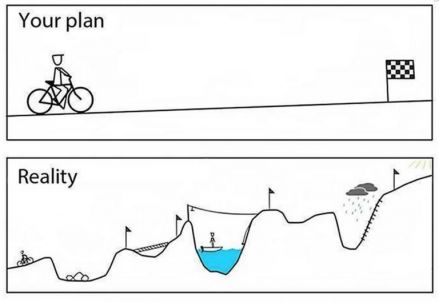A few leaders of my church were afraid this post tries say something to them without naming them. Not so. The entry is directed at me as much as anyone; I lead things, too. My point is that all of us are tempted to be cruel in the post-Covid age of Trump and act the four ways I list. I need to watch it, and if you think you need to watch it, you are probably right.
Some questions beg for an answer, even though the answer is not easy or even welcome. But I have been asking the title to this piece all week: Why are the Post-Covid regimes so cruel? Here is some of what I hear.
Donald Trump is one big reason everyone is more cruel. Trump may be forever pre-Covid – since he may think the virus is fake news, his recovery from it notwithstanding. But he has greatly influenced what is taking root in the world and may bloom. You run into his disciples all the time. They are cruel.
For instance, Trump’s response to the death of Colin Powell last week was very cruel. I was going to say “breathtakingly” cruel, but he, of all of today’s wicked actors, has done so much to normalize cruelty we all feel a new license to take someone out, to maliciously undermine someone, to build walls against enemies, and to make exclusionary laws. It is all normal. His wickedness no longer takes our breath away. You probably saw Trump’s response, since he is the king of “all publicity is good publicity” and he horned his way into the national honors afforded Powell. I don’t want to repeat it, but you can see it here. It was cruel.

Trump is not alone. The country is filled with policies and practices that require people to be cruel. For instance, in a couple of weeks I will be at the southern border with MCC folks. I know I will meet people full of love there. But that love will be more evident because it contrasts with the visible and relentless cruelty of the government.
I am asking the question because of Donald Trump and the border. As a country we are attacked from within and hemmed in from without by a siege of cruelty that is affecting how we think and treat each other. Just witness the incredible popularity of Squid Game.
But more, I am asking the question that needs to be asked because I am seeing the cruel impact of new, post-Covid regimes, inside the church and out, which impact people I know and love: my clients, fellow church members and friends around the world.
Somehow the upheaval of Covid has loosened a new need among a new generation to reform (hopefully, but at least deconstruct) any culture or organization that does not meet a new set of standards. Their passion is often cruel in its application. In so many organizations I hear about, relationships are frayed, leaders are strangely authoritarian, and dialogue is unusually vicious. Here are four stories remembered during a sleepless night that illustrate some of the characteristics of the new cruelty.
Cut off, don’t reconcile
A pastor I know was trying to talk a church member into listening to the struggle of someone reeling from new, “progressive” language about race. She told her pastor, “The hell with’em. Let’m go.” Somehow the new regime has lost Howard Thurman’s way to love, like I said last week, and has decided to perfect the hate. It seems that even Christians, with their “ministry of reconciliation” have perfected the cut off.
Be secret, not transparent
I was in a small group and a pastor told us about the “parking lot meeting” his board had about him last week. In his polity, he is on the board. Outside the church, it is common for accusations to go to HR or to campus committees. The accusations may or may not be true, but sometimes before guilt is established, the accused is hounded out. The spirit of due process is going out of fashion. It is not unusual for someone to get an email notifying them in some oblique way about what happened to them behind closed doors.
Stay safe, not antifragile
In their book, The Coddling of the American Mind, Greg Lukianoff and Jonathan Haidt describe how the new regimes of the new generation have expanded the idea of safety in ways that undermine community and cripple their own development. They insist that we will be happier, healthier and stronger if we
- Seek out challenges rather than eliminating or avoiding everything that “feels unsafe”
- Free ourselves from cognitive distortion rather than always trusting our initial feelings
- Take a generous view of others and look for nuance rather than assuming the worst about people with a simplistic us-versus-them morality.
An over-emphasis on safety makes us fragile and so in need of more safety. A realistic approach to resilience makes us antifragile, more adaptable, more immune to things that might truly harm us. A hallmark of the “be safe” mentality that took on steam in the 2010’s is a preoccupation with words that make people feel uncomfortable. The new regime protects abstract people from abstract issues, but doesn’t have enough relationship to achieve immunity from the everyday wounds of love. People end up needing to protect themselves from love.
Enact law, not grace
One of my pastor friends in the Jesus Collective ended up on the other side of a pandemic-long, zoom-based fine-tooth-combing of his church’s by-laws. That choice, in itself, is a bit breath-taking. During the hardest thing most of us have ever experienced, the leaders decided to take a hard, virus-ridden look at themselves! They re-oriented the church so much he was, effectively, eliminated and could only see a door out as the way ahead.
There is a new focus on law, and especially laws that protect identity. It is true that such protections are a must in our “slave economy,” as two of my Black clients called it last week. But it is not unusual for everything to be seen through a lens of identity and the power struggle to get a just piece of the American pie. If someone promotes the generosity of God, the rain and sun lavished on the good and bad, they might get called out as giving in to oppression. Jesus could end up looking like some sort of supremacist because he chooses to die for others while others have no choice but to die, and atonement sometimes becomes an endless repentance for collaborating with oppressive systems. One of my newest favorites, Karith Foster, suggests a better way to undo white supremacy with C.A.R.E.ing not coerceing.

I blame Covid for much of the cruelty happening, right now. In 2023, when we have all had a year of face time, those of us who have begun again might come up with something as breathtakingly beautiful as Donald Trump is breathtakingly cruel. It is a common thought that the Bubonic Plague in Europe caused so many social, economic and religious changes it led to the emergence of the Renaissance, an amazing era for art, architecture, literature and invention. I’m holding out for that kind of movement and hoping the present regimes are precursors to it.
We are not there yet. And you may be suffering under a new regime flexing its muscles and imposing its ill-considered philosophy or theology. I wish I knew what to tell you to do. My own solution leans toward creatively suffering . I am curious about what is coming. I am going to give my gifts to build it. I want to be the presence of love in it. I am going to trust Jesus to be with us through what could be the worst and best of times.



 My clients in troubled intimate relationships are searching for answers. They often come to a session after spending hours online looking up solutions for their problems. Their search often comes up with damning criticisms and daunting expectations scattered among the good ideas. A few have come to an appointment with a diagnosis that promises a quick fix if the associated steps are accomplished.
My clients in troubled intimate relationships are searching for answers. They often come to a session after spending hours online looking up solutions for their problems. Their search often comes up with damning criticisms and daunting expectations scattered among the good ideas. A few have come to an appointment with a diagnosis that promises a quick fix if the associated steps are accomplished.










 In her book, Dear White Peacemakers Osheta Moore, who will speak more later, quotes a psychologist,
In her book, Dear White Peacemakers Osheta Moore, who will speak more later, quotes a psychologist, 